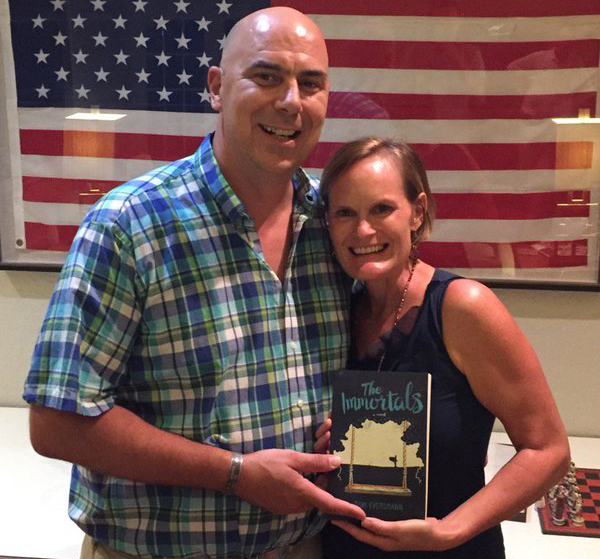
Baltimore native Tori Eversmann has never forgotten what it was like to be a brand-new military spouse, so she wrote her first book, The Immortals, to chronicle that experience. Eversmann is the wife of retired First Sargent Matt Eversmann, whose story was told in the book and movie Black Hawk Down. (Actor Josh Hartnett played Matt in the film.) She joined us to talk about The Immortals—which recently climbed to No. 1 for new release sales on Amazon— as well as the process of writing the book, and why it’s a novel and not a memoir. Though she now lives in Florida, Eversmann will host a book signing at Waverly Brewing Company on Sunday.
As a military spouse, you must have such a different connection to war and see it in such a different way than the rest of us.
It is easy to forget. I used to get self-righteous about it. George W. Bush said we need to continue our lives and my interpretation of that was that we don’t want the terrorists to see our fear. The other side effect of that is, very fortunately, because we haven’t had an attack on American soil, people have been allowed to forget. What I am hopeful about is that, while I think there are military spouses that are going to be interested in reading the novel, I really didn’t write it for them because they know what the book is about. They know that fear and they know the uncertainty. I really wrote it for the civilian population who isn’t familiar with what it is like. Less than 1 percent of Americans have been fighting in these wars, versus World War II, where we had more than 10 percent. It’s a small population, and in my case, I didn’t have any military background. All of our extended friends and family still ask me, ‘How did you do it?’ One of my goals is to shed light on another invisible female population, which are military spouses.
What made you decide to write the book?
I love to read, and my book didn’t exist [when I became a military spouse]. All the books that I could get my hands on were little, handy-dandy guides that told you how to get through it. And I thought, ‘I can only read so much proverbial Chicken Soup for the Military Wife Soul.’ I got it. The other reason, which was probably more important, was that I had an epiphany where I realized that, because of the technological age we live in, most of my friends and peers were communicating with their spouses through email and Skype, and there was going to be no history of this time that was captured in the written word on paper. That frightened me because I thought, ‘What kind of lens are we going to look back through at these wars?’ It’s going to be written by a very myopic group of people, either the government or historians. But what about the personal stories? That was really the defining moment for me. I thought, ‘I need to write this down, for my daughter, for generations to come.’ Originally, the story was my story, which is interesting in one sense, and yet it was very stereotypical in another.
Why did you decide to write a novel instead of memoir?
Very fortunately, I have a really fantastic marriage. We get along very, very well and by the grace of God he came home from the war unscathed—emotionally, physically, and spiritually. Which is great, but that makes a really, really boring novel.But I will say, the first phase of people who are reading the book all know me, and they keep saying, ‘I’m having a really hard time not seeing you.’ And I’m like, ‘Can you do me a favor? When you get to the sex scenes, can you just imagine someone else?’ I have to say, for the sacredness of our private life, all of that is truly made up.
What was it like for you to build a character, since so much of her is likely based on your own experiences?
She is, without a doubt, based on me. The arc of her transformation is 100-percent based on my transformation. I grew up leading a charmed life in Baltimore. I was very fortunate. Then, I fell in love with an Army Ranger and really had a huge amount of naiveté about what I had signed up for. Also, it was pre-9/11, and I liked in my own life that I had that naiveté. I didn’t know so much, and I consider myself a pretty bright woman—I’m college educated, have traveled, and worked. But there’s so much about the military I didn’t know, and suddenly I was thrust into a situation where, because of my tenacity, I didn’t want to be ignorant. I didn’t want to not understand military language. Those aspects of my character are fully based on me. But I wanted to divorce myself from the story, so I made Calli a musician who was clearly very talented. She goes to Julliard, she plays the French horn, she comes from a very nice family in Mt. Vernon, but she’s just never good enough. I also liked that struggle of being thrust in a situation where she knows nothing, and she’s always thought she wasn’t good enough. So, throughout the deployment when her husband is away, she has to figure it out and stand on her own feet.
How long did it take you to write the book?
There are two answers to that. The short answer is nine years and the long answer is three. I started it nine years ago, and I put it on the back burner several times, and then really devoted my life to it in the last three years.
Did you completely re-write it three years ago?
It was a complete re-write. It was really voluminous because I was taking things from my journal and from letters, there were way too many characters, and it was really difficult to follow. I very fortunately spent the money and hired a professional editor to help me. It was basically like going back to college. I was an English major, but I hadn’t written since college. It was a crash course in creative writing, and she was unbelievably helpful, and I did a book mapping exercise, which was brutal. I had to go chapter-by-chapter, page-by-page, and figure out the two or three main themes of each chapter. And then everything else either needed to be deleted or moved to a different section of the book. It was a brutal but completely necessary exercise that pared down the story tremendously.
What did your family think about you writing the book?
They never said this, but I think they thought I was just doing it, but weren’t really sure what the outcome was going to be—until a few months ago when I was like, ‘Here’s the cover of the book.’ My mother and my stepfather live on the Eastern Shore of Maryland, and they have a beautiful piece of property with a guesthouse that’s a good distance away from the main house. And I was really struggling to carve out some time in our house in Baltimore, because there was laundry, or the dogs were staring at me wanting to go for a walk. So I went to their house for a week and sequestered myself, which was so helpful. I felt really fortunate that I had that place to go and do the re-write so I could get to the next editing phase.
And you now live in Florida?
Yes. We decided, after two winters ago in Baltimore, that we’d had enough. We needed a lifestyle change. I was born and raised in Baltimore, had moved away three different times, but it kept sucking me back like a Hoover vacuum. We had a really great life in Baltimore—we still have really great friends and we lived in a great neighborhood. It wasn’t an easy decision, but it was definitely the right decision. I will always have Baltimore blood in me, there’s no doubt. I bleed orange and crave crabs, but I’m really happy living in Florida. I get to look at the ocean every day, and it’s a cool 75 degrees right now. We’re really happy here.
Do you have other books in mind?
Yes. There’s another one that’s sitting in me. I want to keep promoting this book, and I know I can’t do both. In the back of my mind, the book is percolating, and then probably this spring or summer I’ll sit down and do an outline. I think the second book is going to be easier, because it’s not based on me at all, so I’ll be able to have complete creative license.
